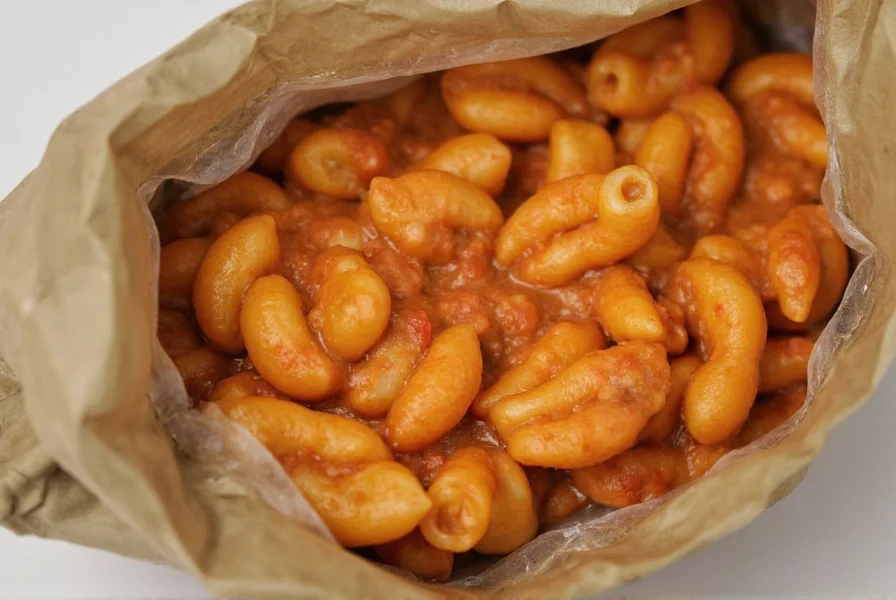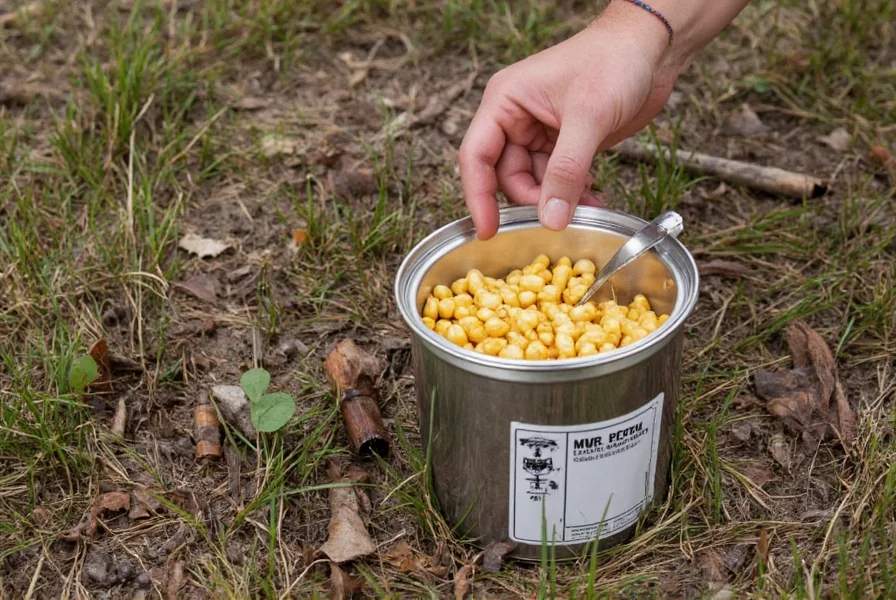For outdoor enthusiasts, emergency preppers, and military personnel, understanding the practical aspects of chili mac MRE is essential for effective meal planning. This comprehensive guide examines the nutritional content, preparation methods, storage requirements, and real-world applications of this popular military ration option.
What Exactly Is Chili Mac MRE?
Chili Mac MRE represents one of the most enduring entrees in the U.S. military's Meal, Ready-to-Eat system, introduced in the 1980s as part of standard field rations. Unlike civilian canned versions, military-spec chili mac contains textured soy protein and real beef pieces in a robust tomato-chili sauce with elbow macaroni. Each complete meal pouch weighs approximately 24 ounces (680g) and includes the entree, side dishes, accessories, and condiments necessary for a balanced field meal.

Nutritional Profile and Ingredients
Understanding chili mac MRE nutrition facts is crucial for those relying on it for sustenance during extended operations or emergencies. A standard serving provides:
| Nutrient | Amount per Serving | % Daily Value |
|---|---|---|
| Calories | 520 | 26% |
| Total Fat | 22g | 28% |
| Saturated Fat | 7g | 35% |
| Cholesterol | 35mg | 12% |
| Sodium | 1180mg | 51% |
| Total Carbohydrates | 62g | 22% |
| Dietary Fiber | 6g | 21% |
| Sugars | 8g | - |
| Protein | 22g | 44% |
The complete chili mac MRE ingredients list typically includes:
- Reconstituted beef
- Textured soy protein
- Elbow macaroni (enriched durum flour)
- Tomato paste
- Chili seasoning blend
- Salt and preservatives
- Dehydrated vegetables
Proper Preparation Methods
Knowing how to prepare chili mac MRE correctly significantly impacts both safety and palatability. The most common method uses the included flameless ration heater (FRH):
- Remove the entree pouch from the outer carton
- Pour the entire contents of the FRH into a plastic bag
- Add 100-150ml of cool water to activate the heater
- Insert the unopened entree pouch and seal the bag
- Wait 5-7 minutes for the chemical reaction to heat the meal
- Remove the entree pouch, cut open, and enjoy
Alternative preparation methods include:
- Boiling water method: Cut open the pouch and add boiling water, letting it sit for 10-15 minutes
- Direct heating: Carefully heat the unopened pouch in simmering water for 10 minutes
- Cold consumption: While not recommended for optimal taste, the meal is safe to eat cold in emergency situations
Shelf Life and Storage Requirements
Understanding chili mac military ration shelf life is critical for emergency planners. Under ideal storage conditions (60-70°F / 15-21°C), MREs maintain quality for 3-5 years. Higher temperatures dramatically reduce shelf life:
- At 100°F (38°C): Approximately 1 month
- At 80°F (27°C): Approximately 3.5 years
- At 60°F (15°C): Up to 5.5 years
Proper storage practices include:
- Keep in original packaging until ready to use
- Store in a cool, dry place away from direct sunlight
- Rotate stock using the "first in, first out" principle
- Check for damaged packaging or compromised seals
Taste, Texture, and Real-World Performance
Based on extensive field testing and user reports, chili mac MRE delivers a hearty, satisfying meal when properly prepared. The best way to heat MRE chili mac significantly impacts the final texture—underheating leaves the macaroni firm while overheating can make it mushy.
Military personnel consistently rank chili mac among the top 5 MRE entrees due to its familiar flavor profile and substantial texture. The tomato-based sauce provides adequate moisture without making the macaroni soggy, and the beef pieces maintain reasonable texture even after long-term storage.

Practical Applications and When to Use
Chili Mac MRE serves multiple purposes beyond military field use. It's an excellent option for:
- Emergency food supply: Ideal for hurricane, earthquake, or winter storm preparedness kits
- Backpacking trips: Lighter than traditional camping food with no cooking required
- Disaster response: Used by FEMA and relief organizations for rapid deployment
- Everyday emergency kit: Keep in vehicles for roadside emergencies
Is chili mac MRE good for emergency food supply? Absolutely—it requires no refrigeration, has a long shelf life, provides complete nutrition, and needs minimal preparation. For families building emergency kits, one MRE per person per day provides adequate sustenance during short-term disruptions.
Comparison with Civilian Alternatives
Chili Mac MRE vs civilian version reveals significant differences in formulation and purpose:
- Preservation method: MREs use retort pouch technology while civilian versions typically use cans
- Sodium content: MREs contain higher sodium for preservation and energy needs
- Weight: MRE pouches weigh less than equivalent canned products
- Shelf stability: MREs maintain quality longer without refrigeration
- Complete meal: MREs include sides, accessories, and heaters while civilian versions are single-component
Civilian alternatives like Stouffer's or canned chili mac provide similar flavors but lack the field-ready convenience and extended shelf life of authentic military-spec MREs.
Advantages and Limitations
Every emergency food option has trade-offs. Here's a balanced assessment of chili mac MRE:
Advantages
- Complete, self-contained meal requiring no additional equipment
- 3-5 year shelf life with proper storage
- High protein content supports energy needs during physical activity
- Familiar flavor profile increases likelihood of consumption during stress
- Flameless heating system works in any weather condition
Limitations
- Higher sodium content may concern those with hypertension
- Limited vegetarian options in standard military-issue versions
- Texture changes slightly after extended storage periods
- Plastic packaging requires proper disposal
- Cost per meal higher than bulk emergency food options
Conclusion
Chili Mac MRE remains one of the most reliable and well-liked field ration options available today. Whether you're building an emergency food supply, planning an extended backpacking trip, or simply want dependable sustenance for unexpected situations, this military-developed meal provides a proven solution. By understanding proper storage techniques, preparation methods, and realistic expectations for taste and texture, users can maximize the benefits of this field-tested ration system.
Frequently Asked Questions
How long does chili mac MRE last before expiring?
Chili Mac MRE maintains optimal quality for 3-5 years when stored at 60-70°F (15-21°C). Shelf life decreases significantly at higher temperatures—approximately 1 month at 100°F (38°C) and about 3.5 years at 80°F (27°C). Always check for damaged packaging, unusual odors, or compromised seals before consumption.
Can you eat chili mac MRE without heating it?
Yes, chili mac MRE is safe to eat cold as all components are fully cooked during manufacturing. While eating it cold won't cause illness, the texture and flavor are significantly improved when properly heated. Military personnel often consume MREs cold during high-intensity operations when heating isn't practical.
What's the difference between military MREs and commercial MREs?
Military-spec MREs undergo rigorous testing to meet military standards for nutrition, shelf life, and field performance. Commercial "MRE-style" products often have shorter shelf lives, different nutritional profiles, and may lack the flameless heater or complete accessory packet. Authentic military MREs are marked with production dates and lot numbers for traceability.
How many calories are in a chili mac MRE?
A complete chili mac MRE entree provides approximately 520 calories, which represents about 26% of the average adult's daily caloric needs. This includes the main entree plus accompanying components like crackers, spread, and dessert. The high protein content (22g) helps maintain energy levels during physical activity.
Can chili mac MRE be used for everyday emergency preparedness?
Absolutely. Chili Mac MRE is an excellent choice for emergency food supply due to its long shelf life, no-cook preparation, and complete nutritional profile. Many emergency management organizations recommend including MREs in household disaster kits for hurricanes, earthquakes, and other emergencies where power and cooking facilities may be unavailable for several days.










 浙公网安备
33010002000092号
浙公网安备
33010002000092号 浙B2-20120091-4
浙B2-20120091-4